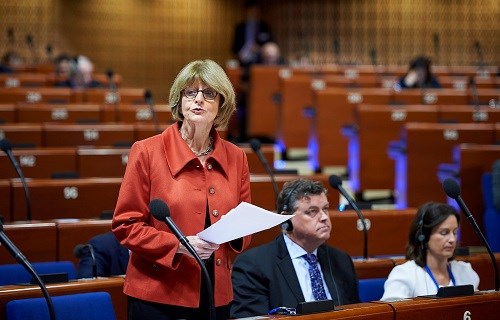Sports governance needs ‘overhaul’: European politicians

Anne Brasseur (left) and Mogens Jensen presenting thier reports at the PACE Winter Session. Photo: Felix Zahn/Council of Europe
25.01.2018
By Stine AlvadAt the Parliamentary Assembly of the Council of Europe’s (PACE) winter session taking place this week in Strasbourg, the parliamentarians took further steps in fighting systemic corruption in sports organisations when adopting two resolutions proposing actions that can ensure better ethics and governance in sports.
Sport itself must take action in initiating reforms that can restore the crisis in confidence that sport is currently experiencing. This was the message in a resolution adopted by European parliamentarians on Wednesday. The resolution is based on Danish PACE member Mogens Jensen’s report “Working towards a framework for modern sports governance structures and practices”.
The resolution further calls for the creation of ISO certification of sports organisations and for the creation of a Council of Europe convention binding member states to observe the upholding of said standards and enable monitoring of the sports organisations.
By adopting the resolution, the parliamentarians also called for more international parliamentary cooperation. The resolution proposes the establishment of a “Parliamentary Alliance for Good Governance and Integrity in Sport”, which should engage both national governments and international parliamentarian bodies in the debate concerning the integrity and governance of sport.
An independent ethics rating system is also proposed and should be operated by “third-party professional agencies of impeccable international reputation”, the resolution says.
Observatory to oversee FIFA governance
While the first resolution looks at sports governance in a broader perspective another resolution, based on a report by PACE member Anne Brasseur, focuses more specifically on football governance and the many recent scandals in the sport. While acknowledging some progress, the report asserts that there has been little change since Gianni Infantino took over the presidency after Sepp Blatter.
The report calls for a line of measures to improve the governance of football including more transparent procedures in member election, more effective corruption initiatives, more focus on upholding civic and political rights in tournament host countries and also proposes to set up a an independent observatory to assess an ensure good governance in football.
This observatory would not have “the power to govern the sport, but ensure that the principles of good governance are being effectively implemented and shared,” the resolution adopted on Wednesday says.
The content of Brasseur’s report prompted critique from FIFA that called the report “incomplete, missing or downright wrong”. Reports also said that the world governing body had been lobbying Swiss PACE members to oppose the report.
The result of the PACE voting on the resolution, however, had 131 of the 146 votes in favour of the report and only five votes against, four of which came from the Azerbaijani delegation.
More information
Read the resolutions:
Read the PACE press releases about the adoption of the two resolutions:
Read a comment piece by Jens Sejer Andersen about the two resolutions and the actions leading up to the vote:




